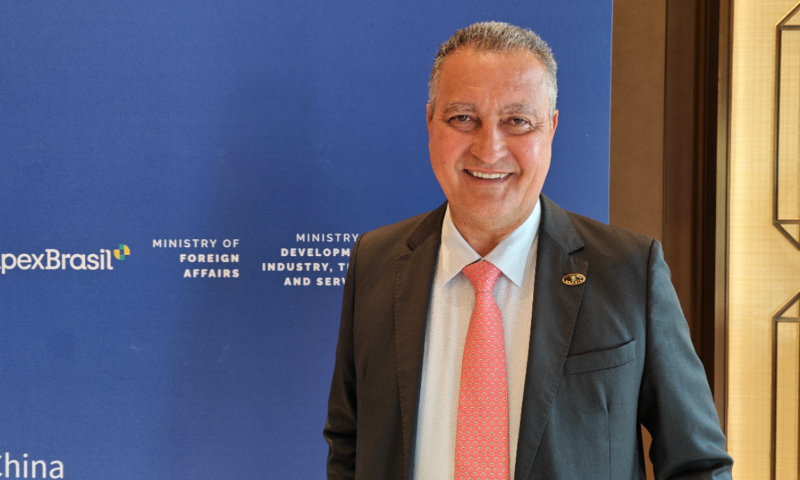
Rui Costa, Chief of Staff of the Presidency of Brazil Photo: Yin Yeping/GT
There are many areas of synergy between China and Brazil in their respective development plans, and potential for more bilateral economic and trade cooperation, Chief of Staff of the Presidency of Brazil Rui Costa told the Global Times in an exclusive interview in Beijing on Wednesday.
Costa is currently on a visit to China with a large delegation of government officials and business representatives from Brazil, led by Vice President of Brazil Geraldo Alckmin. This year marks the 50th anniversary of China-Brazil diplomatic ties and the 20th anniversary of the establishment of the China-Brazil High-level Coordination and Cooperation Committee, which is also one of the main purposes for the visit of the Brazilian delegation, according to Costa.
"This allows us to celebrate the significant development in our bilateral economic and trade relations," Costa told the Global Times.
Costa said that he has another important responsibility here, which is to promote Brazil's Reindustrialization and New Growth Acceleration Program.
This plan aims to advance comprehensive infrastructure development in Brazil, with the participation of Chinese companies, he said. He gave the example of China State Grid recently winning a bid for a transmission project, which exemplifies China's concrete involvement in Brazil.
"I believe there are many areas of synergy between China and Brazil in these development plans," Costa said.
Brazil is pushing for the construction of a transnational railway that would link the Pacific and Atlantic oceans across South America, he said, noting that some projects are already underway. "We welcome more Chinese companies to participate. It will facilitate trade between Brazil and China, as well as Asia, by reducing the transportation time," Costa noted.
He also noted that currency settlement between the two countries has played an increasingly important role in bilateral trade.
President Luiz Inácio Lula da Silva has expressed support for using currencies other than the US dollar, including the yuan, for international settlement, Costa said. He noted that Brazil sees this as a crucial step toward promoting global multipolarity and multilateralism, and "we fully endorse and support it."
Looking ahead, the Brazilian official also noted the need for the two sides to cooperate more in the new energy sector and in pursuing green transformation.
Brazil sees renewable energy as an enabler for further energy transition and it is keen on developing green hydrogen through clean energy, which presents a new direction for cooperation with China, Costa said.
Additionally, in terms of public security, including smart city governance and the use of new technologies, Brazil is eager to collaborate further with China, he added.
Costa also responded to the trend of US protectionism and its attempts to seek "decoupling" from China.
It seems ironic, Costa said, because a country that once championed free trade liberalism is now resorting to protectionism and unilateral measures, which is quite perplexing.




